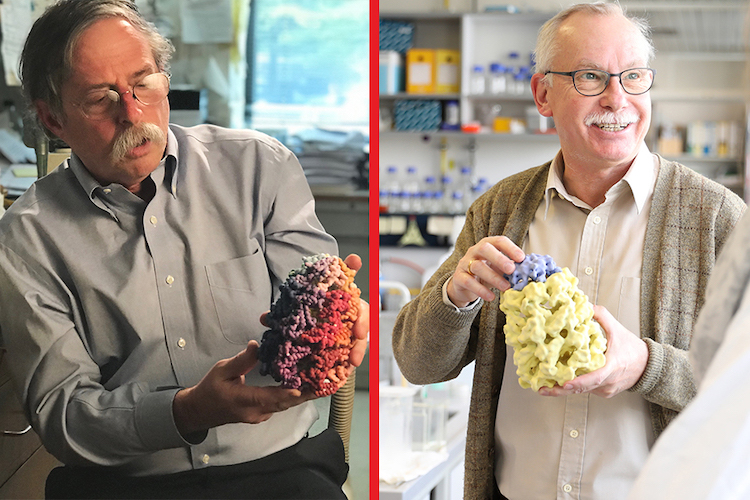Franz-Ulrich Hartl and Arthur Horwich have been named the winners of the 2019 Dr. Paul Janssen Award for Biomedical Research. The award will be granted for their revolutionary insights into chaperone-mediated protein folding, a key process for biological function. The winners will share their insights during the annual award ceremony, which will be celebrated both at the Janssen Beerse Campus in Belgium on September 27 and at the New York Academy of Sciences in the US on October 3, providing attendees with a unique opportunity to meet two of the world’s leading scientists.
By Amy LeBlanc. Header image: Arthur Horwich (left) and Franz-Ulrich Hartl (right) (courtesy of Janssen Pharmaceutica).
Franz-Ulrich Hartl and Arthur “Art” Horwich met when they were fresh-faced postdocs, back in the eighties. The German and American came from separate labs across the seas, but they were both trying to unravel the mysteries of proteins. Their collaboration was to fundamentally change our understanding of proteins and a range of diseases caused by faulty folding.
These days, Dr. Hartl, M.D., is the Director of the Max Planck Institute of Biochemistry and Dr. Horwich, M.D., is a Sterling Professor at Yale School of Medicine and Howard Hughes Medical Institute. Both have gone on to make significant contributions to the scientific literature but are still most famous for their breakthrough work with protein folding. It is for this work that they have been recognized by the Dr. Paul Janssen Award for Biomedical Research.
Unravelling proteins
Proteins are the convoluted keys to almost every biological process taking place in our bodies. When Hartl and Horwich started their collaboration, the prevailing view was that proteins folded spontaneously, without any help from cellular machinery or even an energy source. Their work would turn this theory entirely on its head.
Using a combination of genetics and biochemistry, the two scientists discovered that the mitochondrial protein Hsp60 actually mediated the folding of proteins that had travelled through a mitochondrial membrane. The pair called this mediator a “molecular chaperone”, and the discovery was published in two collaborative Nature papers in 1989.
The discovery lead to an immediate change in the proteomics field. Molecular chaperones were a missing piece of the puzzle that had previously been entirely overlooked. Knowing that protein folding was aided by chaperones like Hsp60 gave researchers a completely new target for their line of inquiries.
The insights from Hartl and Horwich’s work have had broad implications throughout biology and medicine. Vitally, they have given rise to the development of new therapeutic strategies for treating diseases where defects in protein folding are involved. These diseases are complex and varied, ranging from metabolic to neurodegenerative diseases, including Parkinson’s, ALS, Alzheimer’s and even certain types of cancer.
Paul Stoffels, M.D., Vice Chairman of the Executive Committee and CSO of Johnson & Johnson, commented:
“The life-long work of passionate and dedicated scientists, like Drs. Hartl and Horwich, helps us understand the world around us and brings hope for solving complex medical challenges that impact people’s lives.”
Recognizing brilliance
Like the two award winners, Dr. Paul Janssen was one of the 20th century’s most gifted researchers. His work on the discovery and development of more than 80 different medicines has helped save millions of lives.
The Dr. Paul Janssen Award for Biomedical Research was established by Johnson & Johnson to honor his legacy. Sixteen outstanding scientists have received the award to date. Three of these researchers have gone on to win the Nobel Prize, including last year’s recipient Dr. James Allison, for his breakthroughs in immunotherapy.
Don’t miss the opportunity to meet Hartl and Horwich during the Dr. Paul Janssen Award. On September 27, the winners will give a presentation, ‘Science Talk: Protein Folding and Disease’, followed by the Award Celebration at Janssen Pharmaceutica (Beerse, Belgium). They will individually present their discoveries and recent work, and will discuss key questions that must be addressed in the coming decade to harness the potential of this research, including how to build on their groundwork to develop new therapeutics targeting protein misfolding diseases, such as Parkinson’s, ALS, Alzheimer’s and cancer.
For more information and to register, click here.


